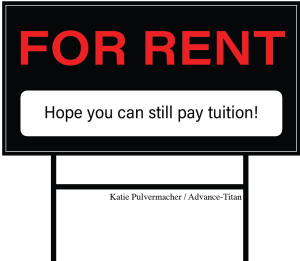Living costs are not livable
1 in 3 landlords up rent because they ‘felt like it’
October 5, 2022
In Wisconsin, the rate of rent increase notices has gone up 69% this year, according to a 2022 Legal Templates study. It is evident college students are not happy with this statistic.
“Already being on a tight budget and paying for college myself, finding decent houses at a reasonable price is nearly impossible,” third-year UW Oshkosh student Alaina Wagner said. “Most houses don’t include any utilities, and this makes the cost of living in these run-down houses even more impossible.”
Legal Templates surveyed 301 landlords and used internal data on rent increases, late rent and eviction notices for their study.
“With inflation increasing costs around the country, it’s hard to predict how becoming a landlord is going to get any easier,” Real Estate Editor Jana Freer said. “But staying on top of landlord-tenant laws can keep them a step ahead.”
On average, 82% of U.S. landlords have increased rent in the last year.
California, a state known for having a high cost of living, had one of the lower percentages of rent increase notices in 2022 at 76%. This can partially be due to their enforced strict housing laws.
According to the California Apartment Association, “many common rental policies can raise fair housing concerns and should be carefully developed to avoid illegal discrimination such as occupancy standards, reasonable accommodations and modifications, assistance animals, live-in aids, source of income, immigration status and children’s rules.”
Despite the passage of the Fair Housing Act, fair housing continues to be a major issue especially in Milwaukee, according to the American Civil Liberties Union (ACLU) of Wisconsin.
“Formerly incarcerated individuals and people with prior eviction records face additional challenges in accessing safe and affordable housing,” ACLU said in a blog article. “This targeted discrimination disproportionately impacts Black and Brown people.”
Grace Noe, a fourth-year student at UW-Milwaukee, said she pays $530 per month not including gas and electric.
“I haven’t had any problems personally with rent rising, but I just moved into this house in August,” Noe said. “I did pay about $100 less at my old place.”
Madison, the fastest growing city in Wisconsin, is facing housing issues. Linette Rhodes, community development grants supervisor for the city of Madison, said Dane County is struggling to expand at such a fast rate.
“We anticipate by 2050, we will have 100,000 new households in the city of Madison,” Rhodes said.
To keep up with population growth, the city estimated it would need 10,000 new homes every five years, according to Madison’s mayor, Satya Rhodes-Conway, in 2021.
Third-year UW-Madison student Petra Landon said she pays $850 per month for her 9-by-10 foot room.
 “My total rent for next year is actually being raised about $200 more,” Landon said. “I feel sad about it. Many other apartment buildings are raising rent as well.”
“My total rent for next year is actually being raised about $200 more,” Landon said. “I feel sad about it. Many other apartment buildings are raising rent as well.”
Her and her roommates were given a letter from their landlord to sign signifying it is “OK” for the rent to rise.
A Wisconsin landlord must abide by the written rental agreement, according to iProperty Management, an online resource for landlords, tenants and real estate investors. Landlords are allowed to increase rent at any time for month-to-month tenants as long as a notice is provided at least 28 days prior to the increase.
Even students at UW-Whitewater are having problems finding housing despite their smaller population.
Third-year UW-Whitewater student Lacy Buending pays rent per semester. She paid $1,900 for this fall semester and will be paying $2,200 in the spring. She has rented with the company in the past, giving her a discount this semester.
“I feel like these are reasonable prices considering the size of the house, the amenities included and it had just gotten renovated over the summer,” Buending said. “I am struggling to find a place to stay next year because of pricing and the housing market in Whitewater.”
So why are landlords increasing rent? In the Legal Templates study, landlords shared the biggest reasons were to keep up with the market, to meet financial needs, property improvements, new employers in the area, neighborhood enhancement, inflation and “I felt like it.”
As bothersome as it sounds, “I felt like it” is a valid response, as they own the property.
However, despite the difficult housing market, most landlords shared they were doing financially well. Of those studied, 92% said their income remained the same or increased compared to last year, and 87% were satisfied with their income.
Bill Schmolinske, a private landlord in Oshkosh, said it is important to understand who you are renting to.
“I think it’s easier for college kids who can incur an increase [in rent] that’s spread among three, four or five people,” Schmolinske said. “If you have a single family and someone has to pick up all the costs, it’s more difficult.”
Schmolinske said his rent prices did not rise this year, but most likely will next year. He said he did not deal with an increase in late payments or evictions.
“[A good landlord] is someone who can be flexible with payments if somebody runs into a situation,” Schmolinske said.
He also said it is important to adapt to tenants’ needs.
In 2022, Wisconsin saw a 52% increase in late rent notices, according to Legal Templates. There was a 95% increase across the U.S. The biggest tenant complaints were refusal to pay at 45% and intentional property damage at 44%.
Following late payments, evictions rose as well by 37% in Wisconsin, above the average of 36% in the U.S.
Based on the Legal Templates study, renting will not get any easier. Inflation is affecting all parts of the economy. According to Bloomberg, the U.S. economy will “narrowly avoid” recession in 2022 and 2023.
Until then, the best one can do is look at all housing options and research properties to find something best-suited for their needs. The housing market is far from stable.














